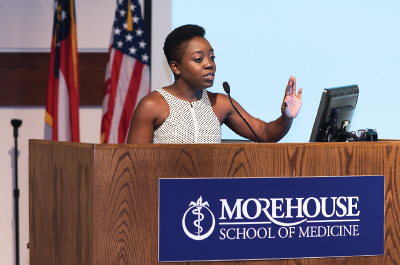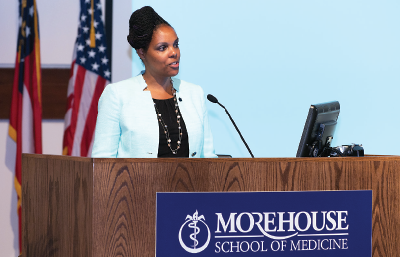Community members, mental health professionals, and state and local judiciary leaders gathered at Morehouse School of Medicine in Atlanta during APA’s 2016 Annual Meeting in May to discuss youth, the criminal justice system, and mental health services.
“There are people with serious mental illness who are admitted to jails yearly,” outgoing APA President Renée Binder, M.D., said in her opening remarks. “People with serious mental illness do not belong in jail, and we must do something about it.”
The event aimed to identify new ways to help youth in the criminal justice system who are in need of mental health services. Throughout the event, speakers discussed the need to strengthen the bridge between the judiciary system and mental health services.
“We have relied on jails and juvenile detention to provide mental health services to some of our youth,” said Peggy Walker, a Juvenile Court judge in Douglas County, located just west of Atlanta.
According to the National Alliance for Mental Illness, at least 70 percent of youth in the juvenile justice system have a diagnosable mental disorder.
“The problem is that if we incarcerate people with mental illness, they run the risk of deteriorating. That is not the best way to approach youth with mental illness,” she said in an interview with Psychiatric News.
“A child who has experienced abuse and neglect may be prone to display behaviors that may not be displayed by children who were not abused or neglected,” said Walker. “What we really need is adequate community mental health services and intensive case management with mental health and criminal justice professionals in the community to address some of these issues.”
Sarah Vinson, M.D., an assistant professor of psychiatry at Morehouse School of Medicine and a coordinator of the event, agreed. “The reality is that our patients’ lives are often touched by the criminal justice system,” she told Psychiatric News. “We do them a disservice by not collaborating with leaders and employees of the judiciary system when we do not understand how the system works.”
Janelle Williams, J.D., a senior assistant public defender in the Atlanta Judicial Circuit, addressed the importance of open communication between parents, psychiatrists, and those in the juvenile criminal justice system. “It’s important that we are all a part of a team when a child with a mental health diagnosis has an open criminal case.”
During the session, members of the community, mostly parents, were able to share their experiences with both the criminal justice and mental health systems and receive feedback from the experts on the panel.
“I hope that participants [of the session] were inspired to act,” Glenda Wrenn, M.D., director of the Division of Behavioral Health at the Satcher Health Leadership Institute and a coordinator of the event, told Psychiatric News. “A lot of networking happened today, and I hope that the participants will act and build on the new relationships and the information that was presented today.” ■


